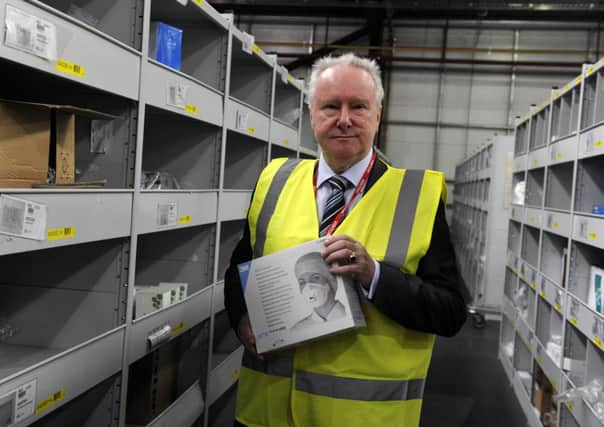Scotland set for new Ebola testing centre


Workers flying into Scotland will be given the same level of monitoring as health and aid volunteers who have been assisting in affected countries, including Sierra Leone, Liberia and Guinea.
Scotland’s first testing facility is to be up and running within weeks, MSPs were told yesterday. Meanwhile, two Scottish Government ministers are poised to visit west Africa to identify areas where help can be offered to the “primitive” health services in the region, health secretary Alex Neil told Holyrood.
Advertisement
Hide AdAdvertisement
Hide AdThe news came as the president of the World Bank appealed for thousands of medical workers to volunteer and help contain the growing outbreak, as transmission rates continue to outstrip the international response.
So far, 59 professionals from NHS Scotland have offered to help, with some of these already out in the affected region.
MSPs were assured yesterday that “robust arrangements” are in place to protect these volunteers from the virus.
Mr Neil said: “We know who is going to west Africa, we know they will be trained… we are confident they will be looked after when they are there and they will be monitored and supported when they return.”
The current Ebola outbreak has infected more than 10,000 people and killed nearly 5,000, and there are growing fears about its potential global spread.
Mr Neil told MSPs there would be a particular focus on oil and gas workers returning from west Africa. He said: “We are working with the oil and gas industry to ensure that any of the oil and gas workers coming or going to affected countries will have access to the same type and quality of monitoring arrangements which are in place for medical volunteers.”
Skills honed in the North Sea industries are in great demand in the developing world, including Africa, and Scottish oil workers are frequent visitors to the continent.
Mr Neil also said Scotland’s first testing facility would mean faster results and diagnosis.
Advertisement
Hide AdAdvertisement
Hide AdSuspected Ebola cases in Scotland currently have to have their samples sent south of the Border for analysis, but a testing service for viral haemorrhagic fevers, such as Ebola and yellow fever, will be up and running in the NHS Lothian region from 1 December.
The minister said: “The public should be reassured the risk of Ebola coming to Scotland is still very low and if it does arrive here, the National Health Service is ready to respond and public health will be protected.”
He added: “Given the importance of ensuring we can identify and diagnose possible cases of Ebola, we have provided funding to NHS Lothian to introduce a national testing service for viral haemorrhagic fevers in Scotland. That service … means that blood samples will no longer need to be sent to the south of England for testing and we will have the results more quickly.”
While he said he was not convinced it was “proportionate or necessary” for the general public arriving in Scotland to be screened for the disease, Mr Neil said: “I am ready to implement screening if our assessment changes.”
The UK’s disasters emergency committee has launched an appeal for the Ebola crisis in west Africa, the first time the charity umbrella group, created in 1963, has sought funds in response to an outbreak of disease.
The move came as Australia was criticised over its decision to suspend entry visas for people from Ebola-affected countries in west Africa, with Uganda’s presidency accusing western countries of “creating mass panic”.
In Scotland, all local councils, schools, colleges and universities have been contacted by the government to alert them to the situation. This includes contact with 30 people from the affected African countries who are currently studying in Scotland.
Mr Neil said: “We actually are in touch with them via their college or university to make sure that they are very well aware of the risk, particularly to let us know if they or any of their friends or family travel to or from west Africa so that we can monitor their situation as well.”
Advertisement
Hide AdAdvertisement
Hide AdThe Scottish Government will do “whatever it possibly can” to help the affected countries if a request comes in for assistance, Mr Neil said. Public health minister Michael Matheson and external relations minister Humza Yousaf are set to visit the region.
“Their health service is pretty primitive in these affected countries, quite frankly,” Mr Neil said. “I’ve asked both Mr Matheson and Mr Yousaf… to visit west Africa and identify any additional help that we can provide.”
Speaking during a trip to Ethopia, World Bank president Jim Yong Kim said: “Right now, I’m very much worried about where we will find those healthcare workers [to support efforts in Africa].
“With the fear factor going out of control in so many places, I hope healthcare professionals will understand that when they took their oath to become a healthcare worker, it was precisely for moments like this.”
Mr Neil insisted the chance of the disease arriving in Scotland was “very low” as there are no direct flights with affected countries and screening is already in place at airports in London and others in Europe.
The disease is transmitted through bodily fluids, and people only become infectious once they have begun to exhibit symptoms of the disease, including in the early stages a fever, joint pain and muscle weakness.
SEE ALSO